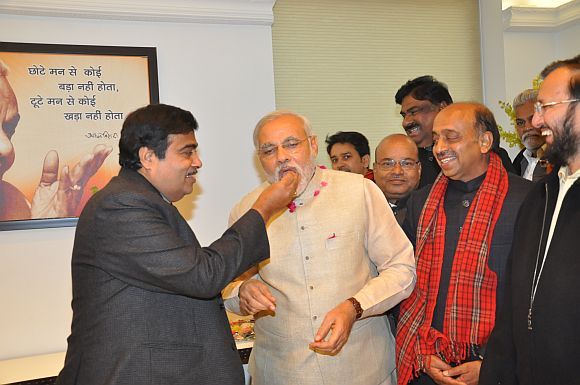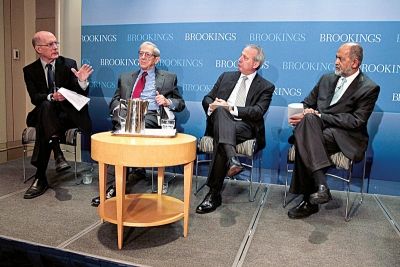'The change may not please everybody as made for the better, but at least there is a sense that some things are about to change.' Aziz Haniffa/Rediff.com reports from Washington, DC.
 "In India, there is a sense that there is a new opportunity coming, and as often happens, it will come with risks," Strobe Talbott -- former deputy secretary of state in the Clinton administration and the man credited along with then external affairs minister Jaswant Singh in forging a new India-US relationship -- told a conference on 'Re-imagining India.
"In India, there is a sense that there is a new opportunity coming, and as often happens, it will come with risks," Strobe Talbott -- former deputy secretary of state in the Clinton administration and the man credited along with then external affairs minister Jaswant Singh in forging a new India-US relationship -- told a conference on 'Re-imagining India.
"The change may not please everybody as made for the better, but at least there is a sense that some things are about to change," Dr Talbott, who is now President of the Brookings Institution, a Washington, DC think-tank, added.
In foreign policy and US-India relations, Dr Talbott felt, there would be a high degree of continuity, pointing out that he had dealt both with the Congress government led by P V Narasimha Rao and Atal Bihari Vajpayee's Bharatiya Janata Party-led government.
"India is underestimating the extent to which it really now is a global player," Dr Talbott lamented. "With regard to particularly geopolitics of the 21st century, which involves to a large measure geo-economics, I see a reticence or perhaps a lack of sufficient consensus on how that role should be played."
"It wasn't a surprise, but it was still a disappointment to me when India decided to abstain in the United Nations General Assembly on the condemnation of what the Russian Federation did in Crimea," Dr Talbott, who is considered one of America's leading authorities on Russia, said.
Both India and the US, he felt, have to strategise on how to "deal respectfully, constructively and realistically with the emergence of China, how to deal with a Russia, both countries with whom India has a long history. In the case of Russia, a friendly history, and in the case of China, a fraught history."
India and the US, Dr Talbott declared, are "more than just multi-ethnic and multi-nation States; we are idea States. And the idea is essentially the same and it is E Pluribus Unum (out of many, one) based on diversity, based on the embrace of diversity, tolerance for people of other faiths and ethnicity. And that's a bond between our two countries that has survived even the last decades of the Cold War."

Speaking about the apprehension of communal tensions in a Modi-led Indian government, Dr Talbott said, "The aberrations -- I see them as aberrations, tragic and blood and murderous aberrations that have occurred from time to time -- just as the outrages that have occurred in the United States based on race and religion, remind us of what the normalcy is."
He reiterated that this normalcy is "respect for diversity."
"Modi," Dr Talbott said, "has a difficult relationship with the US government, as we know, and a less than glowing press in this country. But that's because all Americans who pay attention to India, even if they have never been there, have this idea of a tolerant, syncratic, civilisational State. And when something happens or somebody is identified as being part of that problem, it creates some doubt about what that person would do and represent if and when he becomes the leader of the country."
Bemoaning the "up-and-down mood swings" in US-India relations, Dr Talbott called for "a constructive, pragmatic, purpose-oriented sense of normalcy in the relationship."
These mood swings, he acknowledged, are "another thing that the world's oldest and the world's largest democracies have in common and there are some symptoms of bipolarity in the bilateral relationship."
Images: Top: Nitin Gadkari feeds Narendra Modi a ladoo to celebrate his 2012 election victory in Gujarat. Bottom: Strobe Talbott, left, at the conference Re-imagining India: What's at Stake in the World's Largest Democracy?, organised at The Brookings Institution in Washington, DC. Photograph: Paul Morigi











 © 2025
© 2025